About Vastu Shastra for Buildings
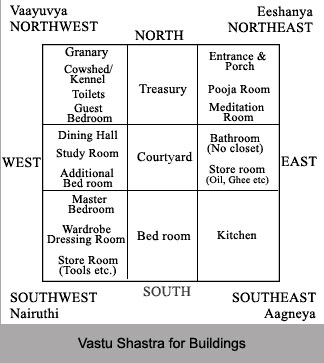 Vastu Shastra can be utilized for building various structures. These include Temples, Hospitals, Factories, Shops, Offices, Educational Institutes, banks, homes etc.
Vastu Shastra can be utilized for building various structures. These include Temples, Hospitals, Factories, Shops, Offices, Educational Institutes, banks, homes etc.
Purchase of Adjacent Plot - Vastu Shastra
Adjacent plots are the plots nearing to the original plot or building. According to Vastu Shastra these plots also should be purchased while keeping in mind some simple points:-
While purchasing the adjacent plot of the original plot or building or while making a deal for purchase or sale of such plot, it should be done only when the sun is in the Vishakha, Revati, Aashlesha, Anuradha, Purva, Mrig, Mul etc. The auspicious constellations should be done on Monday, Thursday or Friday.
•If a plot adjacent to the plot in the northeast direction is available it should be definitely purchased at any cost. This increases the northeast side of the building which leads to prosperity and wealth beyond expectations.
•On the north side if a plot is purchased leaving the north-west corner there is an increase in wealth. If the entire north side with the north east and the north-west corner is purchased it is very beneficial. But purchasing a plot only in the north-west corner of the north side means that there is an increase in the north west direction, which is not proper. There is no progress in business in such direction.
•If a plot whether it is big or small is available in the south-east, the south-west or the west side it should never be purchased. Even if the land is dirt cheap or free of cost. Happiness is lost loss, of wealth, accident or theft expected in such cases.
•An adjacent plot in the south or the west side should not be purchased or taken on rental basis. It leads to quarrels and there is a continuous loss. Therefore, temptation to purchase such plots because it is cheap should be avoided at any cost.
•While living in a flat, if a flat on any of the upper floors is available it should definitely be purchased. Even if it is a little costly, it should be purchased. It would definitely prove beneficial. However, before purchasing, it should be ascertained that the construction of the internal rooms etc. is as per Vastushastra principles. An old flat with fixed unmovable furniture can be purchased, but not with old movable furniture.
•If there is a canal, drain, river or road on the east or the north sides of our building no flat or building on the opposite side should be purchased. However, a flat or building on the other side of the road, canal, drain or river in the south or the west directions of our building should be purchased. It is very beneficial and brings good health and wealth to the owner.
•If a plot is available on the east, the north or the north-east side of the own plot it should be definitely purchased. However, if the plot is adjacent to the plot the intervening compound wall should be removed and minimum construction work should be done in this plot leaving most of it vacant. At any cost due to the purchase of the new plot, the east, the north or the north-east side of our plot should not become heavy or high.
•As far as possible plot on hill should not be purchased. If at all, it is to be purchased, it should be on level ground with residences around it. If a plot on the downward slope of a hill is to be purchased standing at the middle of the hill with slope on the north and the east a plot is available, it should be purchased. But a plot with slopes on the west should not be purchased. The same rules are applicable for agricultural plots and other type of plots.
•As far as possible plot with common well should not be purchased. However, if the common well is coming in the east, the north-east or the north such plots can be purchased. But full benefits are not obtained from such plots.
•If the adjacent plot is for sale, but the owner is not willing to sale. In such conditions by persuading him and without giving him any trouble it is possible by following the rational methods of Vastushastra. Even from an old tenant the plot can be vacated. For this no supernatural help is taken.
•If in the adjacent plot there are many deaths or if illegal businesses or sad events have taken place there, such plots should not be purchased. Every new place should be measured as per the layout plan before purchasing. It is also necessary to check all the corners as per rules of Vastushastra.
•While purchasing a place on the double road crossing it should be in the south-west corner. This would give us roads on the east and the north. A plot adjacent to a bridge, if the bridge is in the east or the north of the plot, should not be purchased at any cost. But if the bridge is in the south or the west it can do to some extent.
L-shaped plots
Generally the L-shaped plots are considered inauspicious. But once they are rectified these plots can also result in happiness and prosperity. The construct should be in accordance with the principles of Vastu Shastra. There are primarily 2 reasons why a plot becomes L shaped.
1. While preparing a layout plot becomes L Shaped if any one corner of it is cut off.
2. It also becomes L shaped if any one corner of it is extended.
There are 16 types of L shaped plots. These have their share of advantages as well as disadvantages.
Plots with East - South-East Corner Cut Off
In such an L shaped plot East - South-East corner is cut off. This results in the extension of the plot towards the East. Hence the benefits of the eastern direction will be easily gained. But one must be careful with the East- South-East corner. Cutting this direction off will generate negative energy. To reduce the negative energy a wall of two feet in height can be constructed. This makes the plot rectangular shaped. The construction of the wall will reduce the Eastern portion of the plot. In turn it will also minimize the positive effect of the eastern direction. According to Vastu Shastra this kind of plot is more suitable. The ancient art of architecture also lays down that the structure should be constructed in the South-West part of the plot. The open area of the plot in the East of the wall can be utilized for open parking.
Plots with East- South-East Corner Extended
Due to the extension the Eastern side of the plot will become short. As a result the benefits of the East direction will reduce. The extension, hence, is inauspicious. The inauspiciousness can lead to legal hassles, health problems, problems with the women in house and persistence in the family. To avert such problems a wall of 2 feet can be constructed. Thus the extended East - South-East corner becomes separate and the plot becomes rectangular in shape. Construct the desired building in the South - Western part of the plot as per Vastu Shastra. Without taking the support of the compound wall rooms of low height can be built for an electric meter, transformer and watchman in the separated East - South-East space of the plot. The space can be used for parking also.
Plots with South -South-East corners cut off
This kind of plot is quite disadvantageous for the residents. This type of L-shaped plot is prone to accidents. Economic losses, infamy and health problems for women are common problems that are related to these plots. For the prevention of such evils, construct the wall of 2 feet and make the plot rectangular in shape. If the owner is planning for high structures then those should be constructed according to the tenets of Vastu Shastra in the major South-West portion of the plot. The separated South - South-West corner of the plot can be used for tree plantation or as a store room.
Plots With South - South-East Corners Extended
This extension will reduce the Southern side of the plot. Though it is favourable, the extension of the South-South-East corner will negatively affect education. Quarrels and economic losses are also possible. One can get rid of such problems if the extended South - South-East corner is separated from the main plot by constructing the wall of 2 feet high. Here too the building construction should be in the major South - West portion. The extended corner can be used as a room for electric meter or for the watchman. It can also be used for parking.
Plots with East - North-East Corners Cut Off
This kind of plot is highly inauspicious. It can hamper a person`s progress. It can also lead to other problems, such as, want of progeny and infamy. Many such problems can be reduced by the construction of a 2 feet wall. As the wall is constructed toward the East it limits the benefits of the East but there will be no adverse effects. There should be no construction of any kind in the open space to the East of the wall. However, the space can be used for garden or parking. Construction like a boring well, swimming tank, water tank or a fountain will be more profitable.
Plots with East - North-East Corners Extended
This kind of plot is very auspicious. The residents here will experience prosperity, progress, happiness, higher education and fame. Even if the Eastern side of the plot has become short the extension of the East - North-East corner leads to prosperity and happiness. But it should be remembered that the extended corner from the main plot should not be separated by constructing a wall of 2 feet. It is more advantageous to use the corner for compound gate or a boring.
 Plots with North - North-East Comer Cut Off
Plots with North - North-East Comer Cut Off
As per the basic principles of Vastu Shastra North - North-East corner is of a great value. Since it has been cut off, the plot becomes inauspicious. It results in obscurity, disorderly education, sickness, economic loss, late marriages and others. Here too a wall of 2 ft. is required to be built in the North. The wall decreases the North side, minimizing its good fruits. But it is better than suffering excessive losses. Never construct any kind of structure to the North of the wall which acts as a protection from the evil spirits. Barring the North-East part, the open space to the North of the wall can be used for various purposes like under ground cistern, gardening, parking and others.
Plots with North - North-East Corners Extended
Such an extension makes the plot auspicious. The residents on this plot are subjected to the wealth, prosperity and reputation. More benefits are gained if the extended corner is used for the compound gate, gardening and boring. The corner should not be separated from the main plot by constructing any walls.
Plots with North - North-West Comers Cut Off
The Northern side of such L Shaped plots is increased. Though the plots in northern direction are considered favorable yet with the corner cut off these become inauspicious. They may lead to several problems, such as, sickness and enmity with friends and relatives. In order to get rid of such problems construct a cistern in the North-East part of the plot. The construction of a boring is also welcome on this plot. For more benefits a compound gate in the North is also acceptable. The plot should be kept intact and the building can be constructed in the South-West part.
Plots with North - North-West Corners Extended
The extended corner here reduces the Northern side and makes the plot very inauspicious. Due to this unwanted enmity, problems regarding progeny and acceptance of left handed dealings are possible. If the extended corner is separated by constructing a 2 feet wall benefits are inevitable. The open space of the extended corner can be utilized for building servants` quarters, watchman`s shelter, godowns, granary or an enclosure for cattle. It can also be used for parking and gardening. However these constructions should not be build by taking the support of the compound walls.
Plots with West-North-West Corners Cut Off
In this plot the Northern and Western sides are increased due to the cutting off of West - North-West corners. So benefits of the North are obtained along with those of the West. But if the West-South-West part of the plot is extended it will prove inauspicious. There is possibility of accidents, family problems and infamy. To reduce evil forces of the West - South-West corner construct a wall of 2 feet from the ground in the West.
Plots with West-Nouth-West Corners Extended
This kind of plot results in increasing the Northern side and decreasing the Western side. It is considered auspicious. The residents of such plots have chances of travelling abroad. Success in politics is also possible for them. However they may suffer from skin diseases and undergo mental tension. The remedy for such problems is the construction of the main building in the major South-West portion of the plot. Construction of a 2 feet high wall also helps.
Plots with West-South-West Comers Cut Off
This type of plot is quite beneficial since its West -South-West corner has been cut off. The extended Western part of the plot should be separated from the main plot by constructing a 2 feet high wall. This will lead to the formation of a rectangular shape plot. Otherwise, accidents, economic losses and mental restlessness are likely to result. It is favourable to use the open space in the West for a nursery, garage and even an outhouse.
Plots with West-South-West Corners Extended
The extension of the West -South West corner in this plot is quite inauspicious. It may lead to mental restlessness, accidents, failures, pains in the joints and other ailments. Construction of a 2 feet high wall will remove the negative impacts. To gain sure advantages from the plot construct a room for lumber in the separated corner. Troubles will definitely arise if the room is given to a servant to live in or rented to someone else. It is better to leave this cut off portion permanently open.
Plots with South-South West Corners Cut off
In this plot the absence of the South -South West corner is good but at the same time the extension of the south is bad. The consequences of the extension of the south may lead to accidents, suffering for women due to mental stress and legal complications. To free the plot of the negative energy the plot needs to be made rectangular in shape by constructing a 2 feet wall. This move will prove quite profitable. If there is any space remaining then one can build a godown or an outhouse. Tall trees can also be grown here.
Plots with South - South-West Corners Extended
According to Vastu Shastra an extension of South -South West corner is the worst plot to own. Owning such a plot may result in accidental death, loss of a body part, such as, the limbs that can cripple a person, loss of a woman in the family, economic loss, entanglement in court matters and ferocity. In order to use the plot it is necessary to reduce the effect of the evil forces. This can be achieved by building a 2 feet wall on the separated South - South West corner. In the open space of the separated corner construct only a lumber room or it can be left as an open space forever. The construction on the rectangular part of the land should be done in the South-West corner. A cistern or boring is essential in the North - East corner of the main plot as it will prove beneficial too.
L and C Shaped Constructions

Buildings carry out the following instructions
1) Maximum open space should be kept towards the Northern and Eastern sides.
2) Building constructions should be done in the Western and Southern corners of the plot.
3) Underground water reservoir, swimming pool and boring should be towards the North-East corner
4) Constructions like playground, garden, fountain or parking should be done in the East or North.
5) In the North-West part toilet blocks, septic tanks or bath rooms should be build.
6) Other units in an establishment, such as, staircase, overhead tank and lift should be placed in the South or West directions.
7) The doors and windows, passages, slope of the ceiling and others must be towards the North or the East.
8) Instead of having a single L or C type buildings, it is better to have separated L or C type buildings.
Construction of Central Space and Plinth
According to the principles of Vastu architectural constructions are, as stated earlier, living organisms and they behave like human beings. Like the living beings, they vibrate and pulsate; they breathe. For such breathing structures, the central space serves as the lungs.
The central space should be set aside or left free for the confluence of cosmic and elemental energies. It should be free of structural elements and it is meant to effect breathing power to the enclosed space. It is considered lo be the spiritual centre and when it is maintained in perfect order and harmony, those dwelling in it could experience well-being and sweetness. The central space could be used as a hall or open courtyard meant for celebrations and weddings. It is prohibited for daily household activities. The daily activities, such as bathing, eating, sleeping and others are restricted to the rings known as Manusya-pada and Paisaca-pada. No construction is laid down either in Brahma-pada or in Daiva-pada.
Rules related to the plinth (upana and Adhisthana) are also to be essentially followed. The height of the plinth should be determined based on the height of the whole structure, which height is ascertained from the width of the building. For the building which is akin to the human form. Upana, the lower level of the basement and Adhisthana, the upper level serve as the footrest and foot respectively.
The height of the plinth should be proportionate to the height of the columns or to the height of the walls. A high plinth not only presents goods elevation but it makes the verandahs useable when the rain falls. The secondary plinths not only cover the building, but it covers the yards all around or the `bdhyangand. This remedies a great deal, the trouble from insects and creeping abominations that are abundant in a climate like that of India.
More importantly it has been said in Vastu that the rules governing the central space and the plinth should be meticulously observed in the case of multi-storied buildings.
b>Purchase of the Adjacent plot along the Diagonal Building
There are certain tips that will prove to be helpful if they are put into use while purchasing an adjacent plot along the diagonal building or a piece of land.
•If there is a space available on the North-East of the diagonal plot it will bring prosperity. Hence it is advisable not to purchase such a piece of land.
•The growth of wealth and trade will take place if there is space in the North-West direction of a diagonal plot.
•A diagonal plot of land situated on the South-West side should not be purchased. It is the root cause of economic loss, loss of human life, problems in business and other unwanted troubles.
•Do not purchase a diagonal plot which is on the South-East direction. Vastu Shastra spells out that it will bring unending problems, economic loss and others. Hence the extension of diagonal plots in the South-East direction should be avoided.
Constructions of Factories
 For establishing a factory there are some directions which are to be avoided while some are good to set up a factory as well.
For establishing a factory there are some directions which are to be avoided while some are good to set up a factory as well.
•To establish a factory, plot should be square or rectangular in shape or it can be at the most 1: 2 in ratio. The south-east corner and the south-west corner should be necessarily of 90°.
•On the south and the north side, a tall thick wall of stone is necessary. At least in the south-west corner of the south-west side there should be a stone wall. In the west and the north direction there can be a barbed wire compound as well.
•In the north-east corner of the plot i.e. in the north or the east wells, borings, underground water storages, fountains etc. should be located.
•The transformer should be placed in a little distance away from the corner in the south-east direction. Watchman`s room should be adjacent to it. The go-down of raw material should be placed in the south-west corner. The main office, laboratory, management unit etc. should be in the west direction. Workers quarters should be placed in the north-west corner as well.
•If the plot is divided into four equal parts by drawing the east-west and the north-south axis, the main plant should be located in the south-west part.
•The water storage should be placed to the north-east of the main plant. This side should not be too high. The main plant should be sloping down step by step from the south to the north. Heavy machinery should be towards the south. Comparatively lighter machinery should be present towards the north.
•In the south-east corner of the plot, boiler, transformer and electrical equipment should be located. The raw material storage room, the storage room for waste material can be placed in the south-west corner.
•The finished Goods of the factory should be kept in the north-west corner. The delivery of these goods should also be made from the north-west corner of the north side. The overhead tank of the plant should be in the north-west or the west direction. Parking should be in the east or the north. The main entrance should be in the east, the north, the north-west, the south-east of the south. But it can never be placed in the south, south-east of the east or the south-west direction. There is no harm if it is present in the west.
Constructions of Shops
 Not only for a happy dwelling but also for a hassle free business environment Vastu Shastra recommends some simple tips for constructing the shops.
Not only for a happy dwelling but also for a hassle free business environment Vastu Shastra recommends some simple tips for constructing the shops.
•Shops, which have the roads and entrances in the north and the east sides, flourish easily.
•Shops with roads and entrances in the south-west and the north-west direction flourish for 10 to 20 years. However, with the passage of time, there is a decline. This prediction has become true in case of 70% of such shops. There are 30% exceptions because other factors are helping in overcoming this defect.
•The show cases or racks should be placed in the south and the west part of the shop. The counter should be situated to the south-east, the south-west or the west sides of the south direction of the shop or in the north-west direction of the shop. However, it should never be in the north or the northeast corner. Maximum furniture should be wooden.
•The customer should be facing the west or the south direction whereas the owner should sit facing the east or the north.
•Water pitcher should be placed in the north-east corner. The main meter, switch board etc should be in the southeast corner. There should be no cross beams in the shop. It is necessary to have a threshold to the shop.
•The cash counter of the shop should be near to the south wall. It should open towards the north or it should be in the west direction opening towards the east.
•Goods to be sold quickly and should be kept in the north-west corner of the north side. It is expected to get sure profits. The counter in the shop should be at right angles. There should be no oblique or round cut present in the shop.
•Shops dealing in books, paper or educational goods do good business if located in the east. For professional shops, the direction north is good.
•Shops dealing in ladies requirements like jewellery, dress material, cosmetics etc. flourish in the south-east corner of the south direction or even in the south direction. However, the main entrance of these shops should not be in the south-west corner.
•Hotels, restaurants, sweetmeat and electric goods shops do roaring business in the south-east corner of the east side. On the other hand shops dealing in black coloured goods like coal, tyres, iron etc. do good business in the south direction. The entrance, however, should not be in the south-west direction. Cloth, departmental stores etc. flourish in the east side. Shops dealing in agricultural goods, seeds, pipes etc. flourish in the west. Showrooms of vehicles flourish in the east and the north-west direction of the west side.
Construction of Theatres
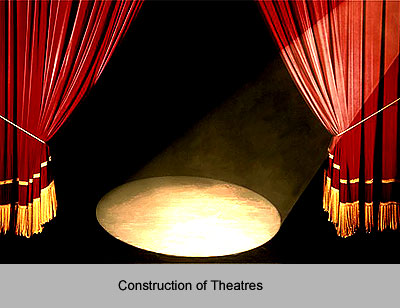 Specific measures have been mentioned in Vastu Shastra for the construction of theatres. Theatres, cinema halls and auditoriums are important public buildings in modern commercial society. They provide plaice for entertainment. The important facets of refined entertainment are literature, fine arts, music, dance and drama, and now, the cinema. This concept of enlightening entertainment and entertainment halls has been studied by; ancient sages and prescription for Vastu-laksana have been specified.
Specific measures have been mentioned in Vastu Shastra for the construction of theatres. Theatres, cinema halls and auditoriums are important public buildings in modern commercial society. They provide plaice for entertainment. The important facets of refined entertainment are literature, fine arts, music, dance and drama, and now, the cinema. This concept of enlightening entertainment and entertainment halls has been studied by; ancient sages and prescription for Vastu-laksana have been specified.
The construction of buildings is generally covered under the: traditional disciplines or Vastu Shastra and Shilpa Shastra. The tradition records about eighteen schools of Vastu thought attributed to Bhrigu, Atri, Vashishtha, Lord Vishwakarma, Narada, Nagnajit, Maya, Visalaksa, Purandara, Lord Brahma, Kumaraswami, Nandisa, Saunaka, Bhaarga, Vasudeva, Aniruddha, Sukra and Brihaspati.
The concepts of Vastu Shastra are based on the Vedic truth that the whole creation analysed from the aspect of the Five Elements, called the Pancha Mahabhutas, viz., Earth (prthivi), Water (apa), Fire (tejas), Air (vayu), and Space or Ether (akasa), has an interactive influence on the human beings, whose physical constitution is made up of these same Pancha Mahabhutas. The external physical buildings and Nature in the form of land exerts an influence (a natural force) which can be reoriented for the benefit of the individual. It is similar to the harnessing of any other natural energies like the wind energy and solar energy and tidal forces for the benefit of the mankind.
Natya Sashtra is a classical text authored by sage Bharata consolidating the principles of earlier works, right from the Vedic times. In the second and third chapters of the Natyashastra, Bharata details the Vastu of the entertainment hall (natyagriha or prekshagriha), an equivalent for today`s theatre, auditorium or cinema hall, offering public entertainment.
The entertainment hall is a place where people of different age groups, sex, temperament and disposition sit together and watch the performance. They open up totally to the presentation in the most receptive way. The time for which they sit together in the hall is a short duration (relatively). This short duration of staying together, yet not inter-acting, but open to the same influence, is a unique feature which normally does not happen in other places or other activities. The experience of the act of entertainment has a long influence on the mind of the spectator audience in the shortest duration in a subtle, yet irresistible, way. This influence is technically called `Kanta-sammita upadesa - similar to the persuasive advice of the beloved, and it moulds the behaviour, character, personality, actions, traits, value standards, culture and language usage, etiquette and behavioural patterns of individuals as well as of society. The Vastu of the entertainment hall, therefore, should be so powerful as to promote healthy development of these aspects and deter negative aspects.
The Vastu of the entertainment hail should be so selected that it brings healthy entertainment to the mind and not cause excitement only to lead one to an evil path.
According to the traditional concepts, the theatre, technically called the Natyaranga, and the act of entertainment (natya-prayoga) are closely comparable to the Vedic sacrifice. The sage Bharata calls Natya Sashtra as the Fifth Veda (panchama-veda), which has been extracted from the four Vedas; the act of entertainment (natya) is called a sacrifice (yajna). The divinity is infused into every act of entertainment. The goals of life (purusartha) are integrated into the act of entertainment hall. Thus, the removal of vulgarity and downfall on the path of entertainment are arrested. The deterrent on production and performance of vulgar entertainment in public to cater to the baser needs of the audience are thus introduced in the section of Vastu. The responses of the inner soul and sensitivity of the mind for nobler aspects of life are points of consideration here.
Vastu Shastra states that unlike places like a house, temple and business centre wherein one primary activity in relation to a set of people can be reasonably limited for consideration, the entertainment hall has a different condition. The situation here is dynamic. It is a continuum. The audience change; the performers and the performance change. Thus, the Vastu of the entertainment hall should be resilient enough for this dynamism. After each performance there is a need to reset the conditions for the next performance. While the physical cleansing and seating arrangements refer to the external environment, a different procedure to reset the subtle (suksma) environment is also recommended. This is technically called the Nandi, the prelude.
This act of Nandi is supposed to be performed before the commencement of each act of performance for entertainment in order to please the deities in charge of the entertainment hall. Great significance is attached to the performance of these Purva-ranga activities, i.e., acts prior to the actual commencement of the performance.
The Vastu for the entertainment halls is considered in two parts: the preconstruction stage for the auditorium, and the post-construction and before the use of the auditorium for the first time.
Traditional disciplines of Artha Shastra and Kama Shastra make references to the planning of such entertainment halls for masses (as a part of the town planning) and the planning of the palace for a king. The study of the existing palaces and historical entertainment halls will yield valuable clues for the tradition of Vastu prevalent in ancient India.
Constructions of Hospitals
 Vastu shastra is an age-old science, which lays some basic guidelines before constructing a hospital.
Vastu shastra is an age-old science, which lays some basic guidelines before constructing a hospital.
•Hospitals should be placed in the east as far as possible and the main entrance should be in the east or the northeast corner. Enquiry window should be in the south-east direction and the waiting room should be placed in the south side.
•Room for checking the patients should be in the north direction. Doctor should sit with face towards the east or the north. The patients should be made to lie down with head towards the south or the west side. The head in the east is also tolerable.
•The racks of medicine and books should be kept in the south or the west. Cash counter should be placed in the south or the west and opening in the north or the east.
•Operation theatre should be placed in the west direction. The patient should sleep with his head towards the south. The doctor should operate with his face towards the east or the north.
•The rooms for the patients should be in the south or the north-west. Overhead tank should be in the west. Drinking water should be in the north-east corner. Toilets should be in the south or the west. Bathrooms should be placed in the east or the north side.
•X-ray room and electrical appliances should be placed in the room in the south-east corner. The emergency and serious patients should not be kept in the south-west corner. They should be kept in the north-west corner.
•The nurses quarters should be situated in the south-east or the north-west direction.
•The central square should be kept open for air and light. The parking should be in the east or the north. The colour of the wall of the hospital should be white, off white or light blue.
•The downward slope of the flooring should be in the east or the north. The staircase should be present in the west, the south-west, the south-east or the north-west direction.
Construction of Banks
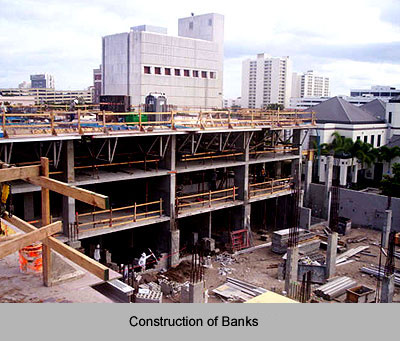 Vastu Shastra deals with the location of the building, geography, topography in order to direct positive energy inside the building and steer out the negativity. There are some simple rules whiles constructing or revamping a Bank.
Vastu Shastra deals with the location of the building, geography, topography in order to direct positive energy inside the building and steer out the negativity. There are some simple rules whiles constructing or revamping a Bank.
•Bank should be placed in the east or in the north. The main entrance should be located in the east, the north east or the north. It should not be situated in the south east, the south-west or the north-west direction.
•The manager`s cabin should be in the south east direction. The manager should sit facing the north. Enquiry counter should be in the east.
•Cash counter should be placed in the north but the cashier should sit facing the east or the north. The cash should be kept in the drawer on the south side opening towards the north. Cash counter should be made of wood and sun mica should not be used on it. There is no harm in colouring or polishing the counter. There should be no oblique cut to the counter.
•The other staff of the bank should sit towards the west. The main strong room, locker and safes should be in the south. All lockers should open towards the north or the east.
•Water arrangement should be in the north-east corner, the east or the north. The toilet should be in the west or the north-west corner.
•As far as possible, the colour of walls should be light yellow. This is the principal colour of Lord Kuber.
•The slope of the flooring should be towards the north or the east.
• Record, files etc. should be kept in the southwest room. The stationary that is needed regularly should be kept in the north-west corner.
•Parking arrangement should be in the north-east direction. Loan disbursement counter should be in the north-east direction. Cash deposits should be in the counters in the middle of the counters of the north direction. Payment counters should be in the western part of the north direction.
•Meeting hall should be placed in the west. The stairs should be located in the west, the south-west or in the south-east direction.
Constructions of Educational Institutions
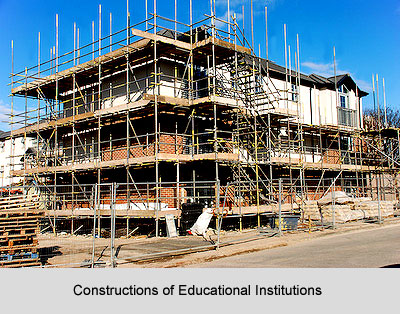 For the greater purpose of contributing to humanity vastu shastra lays some simple tips while constructing the educational institutions.
For the greater purpose of contributing to humanity vastu shastra lays some simple tips while constructing the educational institutions.
•The main roads should be placed in the east or in the west direction. The entire plot should be right angled in shape. The main entrance should be in the east or the north-east but never placed in the south. The main construction should be in the southwest, the south or the west zone of the entire plot.
•The office of the institution should be in the south-east direction and the doors should be placed in the north or the east direction.
•The dimensions of the class rooms should be 1:2 or 1:1. The black board should be put in the west. The platform of the teacher should be at least 1.5 to 2 feet high.
•There should be no beams or cross beams in the class-room. Unnecessary gravitational force due to these beams can be avoided in this way. The entrance of the class-room should be in the east, the north or the north-east direction, it should not be placed in any corner. There is no harm if the staircase of the building is taken at other places than the north-east corner.
•The laboratory should be in the west and its door should be in the east. Staff-room should be located in the north-west direction. Toilets should be situated in the west or in the north-west direction. Underground water tank should be constructed in the north-east or the north direction.
•The colour of the walls should be white, cream or light blue. The flooring slope should be towards the east.
•The Principal`s cabin should be situated in the south-east, the west or the south-west direction. However, the entrance gate should be placed in the east or in the north-east direction.
•Dead stock rooms should be placed in the west or the south-west direction.
•The meeting hall should be located in the north with entrance doors in the east direction.
•Play ground should be placed in the east or the north direction.
•Boring or well should be located in the north-east direction.
•The admission room and the cashier`s room should be placed in the north or the east side of the office.
•Stationary should be kept in cupboards which are placed in the south or the west direction.
•The library should be in the west direction.
Vastu of Temples
For building temples the plot of land should be rectangular in shape. There are several rules for building the shrines. Most of the ancient temples were built by following the basic principles of Vastu Shastra.
Construction of Residential Buildings
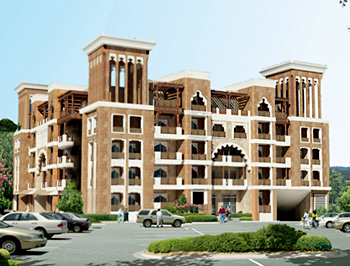 Following the proper rules of Vastu Shastra in the construction of residential buildings is important to a large extent. The concept of Sthala in residential buildings is very significant in Indian Vastu. Sthala generally refers to a covering and depending upon the numbers, there are Ekasthala, Dvisthala, Tristhala, and Chatuhsthala. There are several other types of houses like Chandogrha and Misragrha. As the names themselves indicate, they are constructed freely and with combinations.
Following the proper rules of Vastu Shastra in the construction of residential buildings is important to a large extent. The concept of Sthala in residential buildings is very significant in Indian Vastu. Sthala generally refers to a covering and depending upon the numbers, there are Ekasthala, Dvisthala, Tristhala, and Chatuhsthala. There are several other types of houses like Chandogrha and Misragrha. As the names themselves indicate, they are constructed freely and with combinations.
In Vastu depending upon the status of people residing in the structures, there are a set of different classification, like the Samanyajana-nivasa-griha (common man`s residence), Prabhu-nivasa-griha (residence of lords), Devata-griha (abode of gods) and Prajopayukta-nirmana (structure of public utility).
The Shilpa Shastra prescribes a minimum of eight sections in a common residence. They are: Sridria-griha (bath-room), Alankara-griha (dressing room), Dravya-sthapana-grha (store room), Pacana-griha (kitchen), Puja-griha (place of worship), Bhojana-griha (dining room), Sayana-griha (bed-room) and Dhanagrha (treasury).
Residences of rich and high officials may have many more facilities ranging up to forty-two classes. Additional rooms like Vasa-griha (living room), Kiija (well), Grihini-griha (mistress room), Ayudha-griha (arms cell), Vasanalaya (common room), Homakarma-griha (place of sacred fire), Cakara-griha (place of servants), Sutikalaya (maternity home), Dasalaya (servants` place), Sarhmelana-griha (friends` room), Gosald (cattle shed), Vahanasala (vehicles shed), Balalokana-mandapa (children`s play house), Vivdha-mandapa (marriage place), Vastracchadana-grha (dressing room), Kanyartalaya (maiden room), Bala-griha (boys` room), Vidyabhyasa-mandapa (learning place), Tailabhynga-mandapa (place of oil-bath), Asthana-mandapa (formal court), vilasa-vilasinl-mandapa (amusement room for gents and ladies), Atithi-griha (guest house), Raksakara-griha (bodyguards` house), Parivara-griha (attendant room), Yojya-griha (solders` place), Yuvaraja-grha (prince`s place), Amatya-sanahdna-griha (commanding room), Sopana-mandapa (staircase), Natyamandapa (dance hall), etc.
The rule of Vastu says that always a bath-room should be provided in the Western direction. Kitchen, toilet, arms cell and dining halls can be accommodated in the South-Eastern direction. Southern side is preferred for bed-rooms. South-Eastern direction is good for granary, store house, treasury and ladies room. North-Eastern direction is advisable for dwara.
A residence is divided into three wings: the front, the central and the dorsal. Of them, the front portion is named as Brahma-bhaga and here studies, official transactions, discussions and other study transactions may be carried out. The central portion named as Gandharva-bhaga consists of bed rooms, living rooms, treasuries, entertainment features, etc. The last portion named as Manusya-bhaga consists of kitchen, bath-room, toilet, shed, stable, etc. Thus it is evident that the divisions that were made in Vastu were strictly scientific and a lot user friendly.
Bath-rooms and water tanks, and dressing rooms are prescribed to be located in the North-Western direction. Thus, the classical medium of the Vastu Sastra not only caters to the needs of physical comforts of residents but also looks at the spiritual and psychological implications. In this way, it can very easily be preferred to other systems of unidirectional thought. In a word, Vastu is a holistic approach towards happy living.
Vastu for Multi-Storied Residential Buildings
 Vastu for Multi-Storied Residential Buildings are quite difficult to build according to the Vastu set of rules, whereas residential house can be easily built. Multi-storey Buildings are those buildings, which have many floors. Builders usually utilize each and every nook to built small space in multi-storey which is sometimes opposite to Vastu principles.
Vastu for Multi-Storied Residential Buildings are quite difficult to build according to the Vastu set of rules, whereas residential house can be easily built. Multi-storey Buildings are those buildings, which have many floors. Builders usually utilize each and every nook to built small space in multi-storey which is sometimes opposite to Vastu principles.
Vastu Rules for Multi-Storied Residential Buildings
Vastu compliant buildings prove to be successful and famous however due to dearth of space in multi-storey buildings it is difficult to have everything according to Vastu Shastra. But still there are some basic Vastu rules pertaining to infrastructure that can be followed up to discard or overcome negative effects that may arrive in multi-storey building. They are as follows:
•Choose rectangular or square plot to construct multi-storey building.
•Entrance of building should be made in East or North.
•There should be much more space towards North-east while here playground or lawn can be constructed to use the space properly.
•North-east in multi-storey building should be sloped while South-west portion should be raised.
•Avoid planting huge trees just near the multi-storey building but they can be planted at some distance.
•Avoid any obstruction in the entrance gate of multi-storey building.
•Under-water tank or bore-well should be constructed in North-east while over-head tank can built in South-west.
•Dumping room or store room for waste materials must be made in South-west.
•Toilets in multi-storey building must be made in North-west or West.
•Bathroom can be constructed in North-east or North-west but make sure water drainage from bathroom is made in North-east.
•Kitchens in all apartments must be planned in the South-east direction. The kitchen must never be close to a bathroom or the temple.
•Rooms in the multi-storey building made facing east so that morning sunlight rays falls in the room.
•All flats must have windows and ample ventilation towards the Northern and Eastern direction.
•Stairs in multi-storey building must be made in South or West portion.
•Open patio or balcony must be given in East or North.
•The parking for vehicles in a complex with multi-storey apartments must be planned towards the mid-northern or western direction.
Vastu Consultation for Multi-Storied Residential Buildings
Vastu Consultation of multi-storeyed buildings involves thorough analyses which are as follows:
•Proper location of the flat regarding adjoining flats.
•The exteriors and facing of the flat.
•The location of the beams
•The direction of the Entrance
•The direction and placement of the windows
•The direction and placement of the rooms
•The direction and placement of the furniture
•The direction and placement of the lift
•The direction and placement of the overhead water tank
•The direction and placement of the swimming pool
•The direction and placement of the electrical equipment like generators
•The direction and placement of the stairs
•The height of the upper floor should be less than the ground floor height.
•The upper floor doors should not be at the same place of the lower floor door.
•There should be a little difference in case of all the floors.
•Do not place bedrooms in the North-East corner, because it is not an auspicious place for sleeping.
A true architect and a true Vastu professional can understand the harmony of living and structure. So it is always good to follow the basic and traditional trends of building Vastu while constructing a multi-storied building.




















